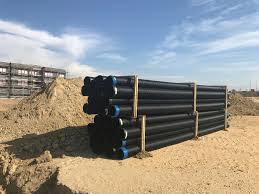Dec . 09, 2024 18:02 Back to list
High-Density Polyethylene Corrugated Drainage Pipes for Efficient Subsoil Water Management
The Advantages of HDPE Corrugated Subsoil Drainage Pipes
Subsoil drainage systems play a vital role in agricultural and civil engineering practices, promoting effective water management and protecting both infrastructure and crops. Among various materials used in drainage pipe production, High-Density Polyethylene (HDPE) corrugated pipes stand out due to their remarkable properties and benefits. This article explores the advantages of using HDPE corrugated subsoil drainage pipes, emphasizing their effectiveness, durability, and environmental friendliness.
Understanding HDPE Corrugated Pipes
HDPE is a thermoplastic polymer known for its high strength-to-density ratio. When formed into a corrugated pipe, HDPE exhibits enhanced flexibility, making it ideal for various subsoil drainage applications. The corrugated structure provides excellent flow characteristics while maintaining structural integrity under various soil pressures.
Advantages of HDPE Corrugated Drainage Pipes
1. Durability and Longevity HDPE corrugated pipes are renowned for their durability. Unlike traditional materials like concrete or clay, HDPE is resistant to corrosion and abrasion, leading to a longer service life. These pipes can withstand harsh conditions, including exposure to chemicals commonly found in agricultural runoff. The expected lifespan of HDPE drainage pipes exceeds 50 years, making them a cost-effective solution for long-term drainage needs.
2. Lightweight and Easy to Handle The lightweight nature of HDPE pipes simplifies transportation and installation. Compared to concrete or clay pipes, which can be cumbersome and require heavy machinery for installation, HDPE pipes can be easily handled by a small crew. This not only reduces labor costs but also shortens installation time, enabling faster project completion.
hdpe corrugated subsoil drainage pipe product

3. Flexible Design Options The flexibility of HDPE allows for various design configurations, enabling engineers to create effective drainage systems tailored to specific site requirements. The ability to bend the pipes during installation means they can navigate around obstacles without the need for additional fittings, thus minimizing potential leak points and ensuring a more robust drainage system.
4. Efficient Flow Characteristics The smooth interior surface of HDPE corrugated pipes minimizes friction loss and enhances flow efficiency. These pipes can handle high volumes of water, making them ideal for agricultural fields and urban landscapes prone to flooding. Efficient water flow reduces the risk of waterlogging, promoting healthy crop growth and protecting infrastructure from water damage.
5. Environmental Benefits Using recycled HDPE in the production of these pipes significantly reduces waste. Moreover, HDPE is fully recyclable at the end of its life cycle. By choosing HDPE drainage pipes, users contribute to sustainable practices that minimize environmental impact. Furthermore, the light weight and durability of HDPE mean fewer carbon emissions related to transportation and installation compared to heavier materials.
6. Cost-Effectiveness While the initial investment may vary, the overall life cycle cost of HDPE corrugated drainage pipes is often lower than that of traditional materials. Their longevity, combined with low maintenance requirements, makes them an economical choice. Additionally, reduced installation costs and fewer repairs over time contribute to substantial savings.
7. Resistance to Root Intrusion One of the challenges with traditional drainage systems is the potential for root intrusion. The smooth and durable surface of HDPE pipes, along with the corrugated design, minimizes this risk, ensuring that the pipes remain unobstructed by tree roots, which can lead to system failures.
Conclusion
In summary, HDPE corrugated subsoil drainage pipes present numerous advantages that make them an exceptional choice for effective water management. Their combination of durability, lightweight design, flexible installation options, and environmental benefits set them apart from traditional drainage materials. As agricultural practices and civil engineering projects evolve to meet the challenges of water management, HDPE corrugated pipes will undoubtedly play an essential role in ensuring sustainable and efficient drainage systems. Embracing this technology not only enhances performance but also contributes to the broader goal of sustainable development in various sectors.
-
High-Quality PVC Borehole Pipes Durable & Versatile Pipe Solutions
NewsJul.08,2025
-
High-Quality PVC Perforated Pipes for Efficient Drainage Leading Manufacturers & Factories
NewsJul.08,2025
-
High-Quality PVC Borehole Pipes Durable Pipe Solutions by Leading Manufacturer
NewsJul.08,2025
-
High-Quality PVC Borehole Pipes Reliable PVC Pipe Manufacturer Solutions
NewsJul.07,2025
-
High-Quality UPVC Drain Pipes Durable HDPE & Drain Pipe Solutions
NewsJul.07,2025
-
High-Quality Conduit Pipes & HDPE Conduit Fittings Manufacturer Reliable Factory Supply
NewsJul.06,2025

